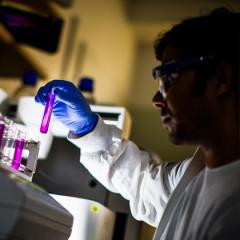A University of Queensland (UQ) spin out company will use the traditional Indigenous knowledge of spinifex from the Queensland outback to develop innovative medical gels, following an agreement between Bulugudu Ltd (owned by the Indjalandji-Dhidhanu people) and UniQuest.

Called Trioda Wilingi Pty Ltd, the spin out company will develop injectable medical gels from cellulose nanofibres extracted from spinifex, which can be used to treat arthritis and osteoarthritis; help deliver drugs more efficiently to the body; and in cosmetic procedures.
Stay on top of our industry news and developments, events and opportunities, by joining The NetworkJoin The Network
“Trioda Wilingi is a success story about what happens when scientists and Indigenous communities work together to translate ancient Indigenous knowledge into modern products like medical gels,” said UQ’s Professor Alan Rowan.
“Trioda Wilingi is a tangible demonstration of how spinifex, a plant that has been a building block for the Aboriginal societies in the desert, will continue to play a role in advancing local communities through business and employment opportunities.”

Under the agreement signed this week, a percentage of all royalties will go into an Indigenous education fund at UQ, to enhance training and education opportunities for Indigenous Australians.
“Our congratulations go to the many dedicated stakeholders who have been critical to this project since its inception more than 15 years ago and include ANFF, UniQuest, Uniseed and and the Indjalandji-Dhidhanu people,” Professor Rowan said.
The project was originally conceived by Professor Paul Memmott from The University of Queensland’s Aboriginal Environments Research Centre, and Bulugudu Ltd Director and UQ Adjunct Associate Professor Colin Saltmere AM and started with an Australian Research Council Discovery Grant.
Other UQ researchers involved in the various stages of the project include Professor Darren Martin, Dr Nasim Amiralian and Dr Pratheep Kumar Annamalai who were the original inventors of the underpinning patent family, as well as Professor Alan Rowan.
Adjunct Associate Professor Colin Saltmere AM is an elder among the Indjalandji-Dhidhanu traditional owners of the region around Camooweal and the upper Georgina River and he said spinifex grass was sacred to Indigenous people, but also had a lot of purposes.
“Our people used spinifex for thousands of years, weaving it for shelters and to carry things, and using its wax and oils to attach spear-heads and so on, and even for treating wounds,” said Adjunct Associate Professor Saltmere.
“Trioda Wilingi, which means special grass is an example of a marketable product that can be farmed in remote Australia to create new industries and employment opportunities,” he said.
Bulugudu is part of the Myuma Group, which is a collective of companies owned by the Indjalandji-Dhidhanu people.
The Myuma Group was critical in the reforms of Queensland’s Biodiscovery Act enacted in 2020 which meant First Nations peoples’ traditional knowledge can only be used via agreement with the knowledge custodians, consistent with the United Nations Convention on Biological Diversity.
“We are thrilled to think medical products, including gels created by Trioda Wilingi will be done so using Indigenous IP under the Queensland Government’s Biodiscovery Act.”


